Gretchen Whitmer Is Both Loved And Hated In Michigan — And Still 'Fighting Like Hell'
- Oops!Something went wrong.Please try again later.
- Oops!Something went wrong.Please try again later.

Michigan Gov. Gretchen Whitmer (D) stands by as Michigan Attorney General Dana Nessel (D) speaks to supporters during a campaign kickoff event in Detroit on Oct. 21. (Photo: Brittany Greeson for HuffPost)
DETROIT, Mich. — Gretchen Whitmer loves to talk about unity and common purpose. She did it in 2018, when she first ran for governor of Michigan, a Democrat promising to “fix the damn roads” and to work with Republicans on solving manageable problems. And she’s doing it now, as she runs for a second term. In a televised debate with her GOP opponent two weeks ago, she started by citing the virtues of bipartisanship and proclaiming that “we all want the same things.”
But nowadays, the idea that everybody shares common values is a dubious proposition at best — across the country, as in Michigan. And Whitmer knows that better than anyone.
State Republicans have called her and her allies in government “witches,” described her as a tyrant and sued to strip away her emergency powers. Some of their supporters have marched on and then into the Capitol building while brandishing semi-automatic rifles. A handful of militia members plotted to kidnap her, while some talked about hanging her, before the FBI arrested them.
The backdrop for the plot, the protests and the name-calling was Whitmer’s public health orders during the first months of the pandemic, and the wrath they brought from former President Donald Trump, who was tweeting things like “LIBERATE MICHIGAN!” At a rally in Lansing, Trump, indignant that Whitmer continued to criticize him after “our people” helped her — an apparent reference to federal law enforcement arresting the would-be kidnappers — mused of the affair: “People are entitled to say maybe it was a problem. Maybe it wasn’t.”
The major public health orders lapsed long ago and Trump isn’t president anymore. But the animosity toward Whitmer has endured, and Trump’s supporters, who now control the state party, have put forward a slate of candidates who think, talk and promise to act like him. Tudor Dixon, Whitmer’s challenger, is one of them.
A former actor, business manager and right-wing commentator, Dixon has accused Whitmer of backing “radical sex and gender activists” who put “pornography” in schools, of trying to defund the police rather than fight crime, and of using taxpayer dollars to subsidize Chinese communists. She routinely refers to Whitmer as “Gretchen” rather than using her title and, during a September campaign swing where Donald Trump Jr. was a guest, she used the abduction plot as the punchline of a joke about Whitmer’s COVID-19 closure orders. “For someone so worried about being kidnapped,” Dixon said, “Gretchen Whitmer sure is good at taking business hostage and holding it for ransom.”
Behind Dixon’s rhetoric is a far-right agenda with far-reaching potential to change life in Michigan, especially if Republicans win other statewide races and keep control of the legislature. A school funding proposal backed by former Trump Cabinet member Betsy DeVos could lead to a program that puts public money into private schools. Abortion could become illegal, thanks to a 1931 prohibition that Republicans have said they will enforce. And the state’s election machinery could fall into the hands of Trump supporters determined to “stop the steal” in 2024, when Michigan’s electoral votes could plausibly determine who wins the White House.
To succeed, Republicans need to get past Whitmer. And they’ve got plenty of voters cheering them on. The people here are as anxious about inflation and crime as any in America. Many are angry about the way pandemic restrictions affected their lives, or about what their kids are learning (and not learning) in school. Whitmer has to answer for all of this, just like so many other Democrats running for office this year.
But Whitmer has a lot going for her, too. I have followed her career closely, going back to that 2018 campaign, when I interviewed her as she was making the rounds in suburban Detroit diners. I tracked her efforts to fix the roads and to steer the state through COVID. For the last three months, I’ve been attending campaign events, interviewing people who love her and people who hate her, and speaking directly with her in a series of short conversations.
Whitmer has a flair for retail politics that even her adversaries acknowledge. She can point to bipartisan legislative accomplishments as well as evidence that her actions on COVID ultimately saved many thousands of lives. She’s also built a devoted following among voters who have come to see her as somebody who thinks and talks like they do, and will protect them fiercely when their interests, freedoms or very lives are in jeopardy.
That’s especially true when it comes to reproductive rights. Dixon says abortion should be illegal in nearly all cases, including rape and incest, explaining in one interview that the experience of carrying a baby in those circumstances can create “healing.” Whitmer, who has spoken about her own experience as a rape victim having to contemplate a possible pregnancy, has pledged to block Michigan’s 1931 ban with whatever authority she has. She’s done it once already: If not for a lawsuit she filed early this year, some conservative county prosecutors might be bringing cases right now.
Whitmer’s lead in the FiveThirtyEight polling average has shrunk from double digits to about five points, where it has stabilized. It’s anybody’s guess whether the campaign dynamics have really changed or whether polls are simply recognizing a tighter race that was there all along. It’s also impossible to know whether surveys are undercounting Republicans or if there will be a late shift in the GOP direction, which is what happened in the 2016 presidential election, when nearly every poll predicted Hillary Clinton would win Michigan — right up until she didn’t.
The backlash to that election, and Trump’s presidency, helped make Whitmer governor. When Trump went on to lose his own reelection bid, leaving a trail of blood at the U.S. Capitol on his way out the door, there was some hope that his brand of politics would subside within the Republican Party. Dixon’s candidacy is proof that it hasn’t, and as Michigan goes this fall, so too may go the country in two short years.
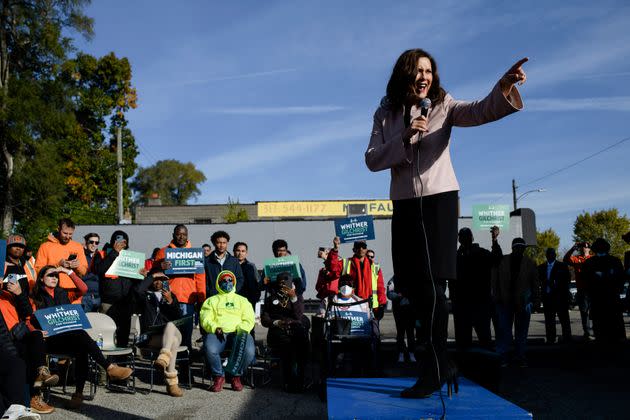
Whitmer speaks to supporters during a campaign kickoff event in Detroit. (Photo: Brittany Greeson for HuffPost)
Gretchen Whitmer is sitting across the table at a suburban Detroit high school, talking about one of her favorite subjects: her mom and dad. It’s late August and she has just finished a roundtable with educators and parents. Now she’s explaining how her parents both worked in government, and how they were able to get along even though her father, Richard Whitmer, was a Republican and her mother, Sherry Reisig Whitmer, was a Democrat.
I ask what dinner conversation was like, whether there were grand policy debates like the Roosevelts, Kennedys or — to use a Michigan example — the Romneys once had. Not really, she says. They came from a long line of educators and ministers, or “teachers and preachers” as she likes to put it, and saw themselves as heirs to that tradition. “I think there’s a tendency to conflate politics and public service,” Whitmer said, “but they were public servants.”
Whitmer talks about her parents and their politics a lot, but there’s a coda that she doesn’t mention so frequently. It’s about her father’s patron, Republican William Milliken, who was the longest-serving governor in Michigan history and had a reputation for working with his adversaries, especially on issues like the environment.
In his later years, Milliken watched the GOP drift temperamentally and philosophically — until 2016, when it nominated Trump to be president. “This nation has long prided itself on its abiding commitments to tolerance, civility and equality,” Milliken explained in a statement endorsing Clinton. “I am saddened and dismayed that the Republican Party this year has nominated a candidate who has repeatedly demonstrated that he does not embrace those ideals.”
State GOP leaders attacked him as a “RINO” (Republican in name only). His county GOP chapter officially disavowed him. Whitmer’s father took notice of what was happening to his mentor, and she did too. “They were calling him a RINO ― Bill Milliken, a RINO ― and I think that was one of those times where I realized, OK, this is changing and in fundamental and important ways.”
It was especially jarring for Whitmer, because her career in politics began in a world much more similar to that of her parents. Despite some earlier aspirations for a career in sports journalism — she was eyeing the anchor desk at ESPN, not the governor’s chair in the legislature — she opted for politics following a college internship in the state House during the early 1990s. At the time, the two parties had a formal power-sharing arrangement, alternating leadership posts each month, because they had exactly the same number of seats.
“It could have been complete chaos and gridlock,” Whitmer recalled. “But instead, these leaders said, ‘You know what? These are the facts we’re dealing with, so we’ve got to figure out how to make it work.’ And every other month, they’d switch who chaired committees, and no one was jamming their agenda down someone else’s throat because they knew, all right, if we don’t play fairly this month, they’re going to serve it right back to us next month.”
Not that Whitmer thought the parties were the same. She identified as a Democrat — mainly, she told me, because Democrats were the ones focusing on protecting women’s rights and using government to promote economic fairness. But while she proved a capable partisan as a member of the state legislature, eventually moving from the House to the Senate and becoming the Democratic leader, she nurtured relationships with GOP leaders — including Gov. Rick Snyder, a business-oriented Republican who in 2013 wanted to expand Michigan’s Medicaid program through the Affordable Care Act. After he ran into opposition from GOP senators hung up on the initiative’s association with “Obamacare,” Whitmer rounded up the Democratic votes it needed to get a majority. More than a million Michiganders have health insurance as a result.
“She’s not a bomb-thrower,” said Jordan Acker, a trial lawyer and longtime Democratic activist who is now one of the statewide elected Regents for the University of Michigan. “She’s somebody who’s interested in legislating, not game-playing.”
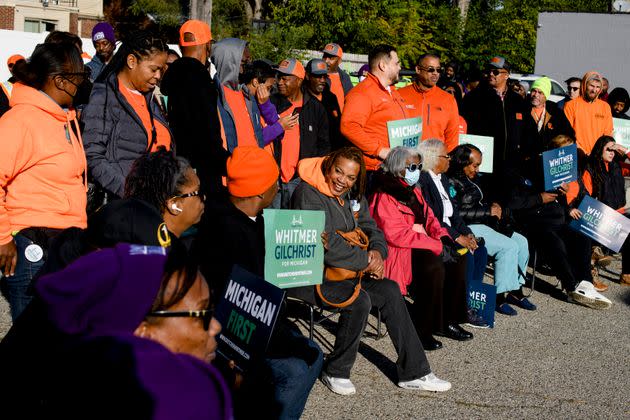
Supporters gather at the start of a campaign kickoff event for Whitmer and Lt. Gov. Garlin Gilchrist II in Detroit on Oct. 21. (Photo: Brittany Greeson for HuffPost)
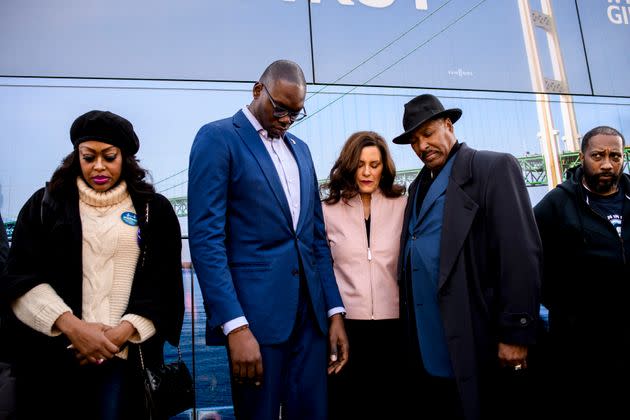
Whitmer prays alongside Gilchrist, left, and Rev. Dr. Curtis C. Williams, right, at the conclusion of a campaign kickoff event in Detroit on Oct. 21. (Photo: (Brittany Greeson for HuffPost)
Whitmer filed papers to run for governor in January 2017. She spent the next year criss-crossing the state, lining up endorsements and filling a war chest with donations. It was enough to scare off would-be challengers from the party establishment and left her with just one main rival: Abdul El-Sayed, a former public health director from Detroit.
El-Sayed was a young, relatively unknown progressive whose platform included a state version of “Medicare for All.” Whitmer’s backers were thrilled she would have the chance to position herself as the moderate in the race, which was both how she felt most comfortable and, they figured, how she could best appeal to swing voters. But El-Sayed, a former Rhodes scholar, was a sharp debater and electrifying speaker whose grassroots support threatened to turn the campaign into a rerun of the Clinton-Bernie Sanders 2016 primary ― only this time, with a progressive who could win.
It was in the face of that challenge that Whitmer settled on her “fix the damn roads” pledge, which in addition to addressing an issue on the minds of Michiganders — the state really does have some of the nation’s worst roads — conveyed her commitment to focusing on narrower, more carefully tailored initiatives. No less important, it wasn’t wonk-speak: She said “roads,” not “infrastructure,” and not just roads but the damn roads.
Some allies say that ability to communicate in a relatable way is what first drew them to her. “I remember seeing her for the first time, in this small group, and I’m not sure what I was expecting,” said Mallory McMorrow, who at the time ran a small consulting firm and was living in the northern Detroit suburbs, and is now a Democratic state senator. “And she starts talking about her daughter, and the ways she wants to make Michigan a better place for her, and I’m like, ‘OK, this is a normal person.’”
Whitmer and her team cultivate that image; this summer, they called local campaign events “Grillin’ with Gretchen.” But it also seems to come naturally to somebody famous around Lansing for her playful Michigan boosterism and attendance at college football tailgates, not to mention a Michigan accent probably most detectable when she rushes through words or flattens out her “a” sounds with a nasal twang, so that “appreciate” becomes “uh-pre-shate” and “supposed” turns into “sposed.”
Whitmer’s ability to come across as Michigan’s everywoman may help her avoid the elitist label that has made it difficult for Democrats like Clinton to connect with average voters. Of course, Clinton faced another, equally familiar political problem during her presidential bid: She was a woman.
Although attitudes about gender have evolved a great deal in the past few decades, political scientists like Kelly Dittmar of Rutgers University say women still face a penalty when seeking offices like president or governor because “those traits most associated with political leadership, and in particular executive leadership, still lean more heavily towards those associated with men and masculinity.”
Gender doesn’t just come into play via internalized biases. Whitmer experienced plenty of blatant sexism. In the legislature, men were always commenting on Whitmer’s looks; in 2008, after the men’s magazine Maxim ranked her No. 8 on its list of 10 “hottest politicians” in the world, a few even started calling her “ocho.”
“It was there every day,” Whitmer told me. “And like every woman in that position, I had to do a lot of mental gymnastics to figure out, how do I respond to it? Do I laugh at it? Do I pretend I didn’t hear it? Do I take it on? Is this a moment where I could maybe educate someone, help them to be a better colleague?”
During the 2018 campaign, a debate coach advised her to put smiley face drawings on her notes, as a reminder to avoid seeming too intense when she was on the attack. “That’s just so saccharine, like — a smiley face is not going to make me smile,” she later told BuzzFeed. Then she remembered a line from a stand-up show she’d seen recently, about women saying “it’s shark week, motherf**ker” as a way to show they were no longer afraid to talk about their menstrual cycles. She started writing “It’s shark week” on her notes. “It’s funny and it’s about women’s empowerment, and it makes me smile.”
(Two years later, as she was doing a camera test for her virtual address to the 2020 Democratic convention, she said “It’s shark week” and then mouthed “motherf**ker” without saying it. “I have learned about the hot mic,” she joked.)
Gov. Whitmer (D-MI) jokes before going live: "It's not just Shark Week ... it's Shark Week *mouths expletive*" pic.twitter.com/KSndbTvLZi
— The Recount (@therecount) August 18, 2020
Like so many women, Whitmer has had to balance work with caregiving, including at one of the most critical moments of her career. Right near the end of her first legislature campaign, her mother got a terminal cancer diagnosis. Over the next 20 months, as she took office while also becoming pregnant and then giving birth to her first child, Whitmer was sometimes spending hours a day with her mother, if not helping with the care then helping with the bills. “I remember going to her house,” Whitmer recounted, “and she’s at the kitchen table with her head wrapped from the chemo, and in her hands, while we’re going through insurance company denials.”
Almost two decades later, in her general election for governor, Whitmer used that story to bludgeon Bill Schuette, the Republican attorney general who had been a leader in the fight to repeal the Affordable Care Act. It almost certainly helped Whitmer win over women voters, who were among the population groups most angry about Obamacare repeal, and who recognized in Whitmer one of their own. Their high turnout was a big reason Whitmer won.
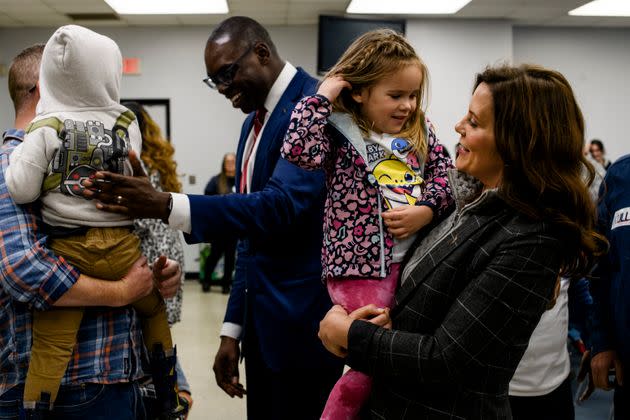
Whitmer holds 3-year-old Emmeline Miller, at the conclusion of a campaign event at the UAW Local 3000 offices in Woodhaven, Michigan, on Oct. 26. (Photo: Brittany Greeson for HuffPost)

Whitmer looks on as Rep. Debbie Dingell (D-Mich.) speaks to attendees during a campaign event at the UAW Local 3000 offices on Oct. 26. (Photo: Brittany Greeson for HuffPost)
In her election night victory speech, Whitmer returned to her themes of unity and cooperation, adding a personal touch when she thanked her ex-husband, who was in attendance, for being such a great father to their daughters. And of course she vowed to fix those damn roads.
But that effort quickly ran into trouble. As a candidate, she had dodged questions about funding and left her plans vague. Then, as governor, she proposed a new tax on gasoline, arguing consumers would save enough on car repair to offset the higher costs. Republicans rejected it and Democrats said they wouldn’t promote it. She has since used executive authority to finance a road plan with bonds, and data suggests the overall condition of roads has improved with plenty of work underway. (Detroit Democratic Mayor Mike Duggan, a Whitmer supporter, says it’s like Michigan has been “invaded by orange and white cones.”) But the plan covers only some of the highways that need work.
Whitmer had better luck with a bipartisan auto insurance initiative that lowered rates by nearly 20% in its first year, according to a University of Michigan study. But the new law also drained money that had been subsidizing home care for victims of serious accidents, and many people lost caregivers as a result. Among those affected was the brother of journalist Chad Livengood, who wrote an award-winning series of columns for Crain’s Detroit Business about the toll it was taking on families like his. Whitmer has said she’s pushing the legislature to address this. In the meantime, a state court has intervened to push caregiver rates back up.
Whitmer’s clearest and biggest legislative accomplishment may be a series of programs to help finance higher education, including one that makes community college essentially free. It addresses a relative lack of skilled workers that has dissuaded some large employers from locating headquarters here, including Amazon when it rejected Detroit’s bid for HQ2 back in 2018. Already more than 18,000 Michiganders have enrolled under one key initiative, according to official statistics, and that’s for a program that didn’t even launch until 2021.
But it’s not clear how much Whitmer’s legislative record has registered with the public, because the dominant storyline of her tenure ― and, until recently, in her reelection campaign ― has been her management of the COVID-19 pandemic.
Michigan was among the states hit earliest and hardest by COVID. The virus spread quickly through the Detroit area, where the population’s high rates of underlying conditions like lung disease and diabetes were the equivalent of biological kindling. The patient load overwhelmed facilities and, at one point, the state’s second-largest hospital system issued guidance on how to ration ventilators, because they were about to run out.
In those early weeks, Whitmer was scrambling to find supplies while figuring out what public health measures to take amid inevitable public skepticism. “I remember her calling me,” Debbie Dingell, the veteran House Democrat from the Detroit area, told me recently. “I remember her saying, word for word, ‘These people’s lives are in my hands. If I don’t make the right decision, they’re going to die.’ It was in her voice. She understood, at her core.”
To withstand that pressure, and act on behalf of the people in Michigan, there’s a lot to be commended there.Abdul El-Sayed, former Michigan gubernatorial candidate
During this period, Whitmer consulted regularly with several groups of outside experts, some from the state’s universities and others from around the country. One of those advisers was Ezekiel Emanuel, the physician and former Obama administration official, who also advised several governors during the pandemic. “I was very impressed. She asked really good questions,” said Emanuel, who is now a vice provost at the University of Pennsylvania. “She was also very clear about limitations, things she couldn’t do … [she would say] I can impose these requirements or impose restrictions, but if the public isn’t there or isn’t going to adhere to them, they’d do no good.”
To help with the public, Whitmer was counting on support from Republican leaders ― and, at the pandemic’s start, she got it.
In early March, when she closed school buildings and limited gatherings to less than 250 people, Senate Majority Leader Mike Shirkey issued a statement for Republicans: “While this action may seem severe, we believe it is appropriate.” He issued similar statements a week later, when she issued a full stay-at-home order, and early the next month when she closed schools for the duration of the year.
But after that, Republicans stopped supporting Whitmer and started criticizing her, eventually filing lawsuits saying that she had exceeded her emergency powers under existing Michigan law. They won those cases; Whitmer was able to continue issuing orders through the Health Department, which has separate legal authority. Shirkey in particular became a vocal critic of Whitmer’s shutdown orders, at one point challenging her to a “fistfight on the lawn” of the Capitol grounds. He also bragged that he had “spanked her hard” in legislative negotiations. (Months later, a fellow Republican angry over Whitmer’s posture on COVID said she had “emasculated” her partisan opponents.)
Republicans say they started speaking out because Whitmer had gone too far, was causing too much damage to businesses and wasn’t serious about soliciting or heeding their input. Plenty of conservatives, including those at the Mackinac Center for Public Policy, agreed about the policy effects and produced research making the substantive case against her orders.
Whitmer says GOP leaders in Michigan were taking their cue from another Republican — the one in the White House — and feeding off the volatile political energy he was pouring into the state.
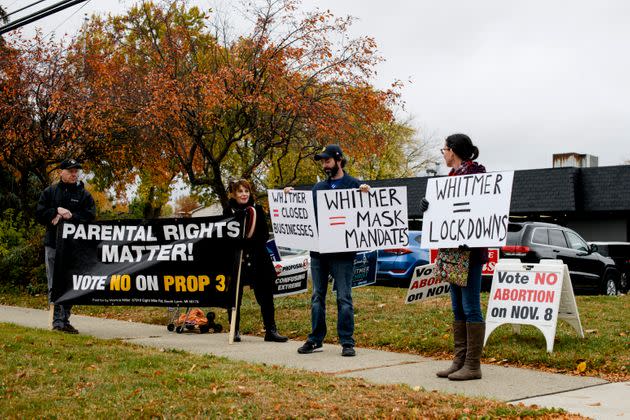
From left to right, A man who wished not to be named, Lynn Mills, a pro-life advocate, Jeff Domsic, of Canton, and Cydney Domsic, of Canton, hold signs in addition to the ones they added to the lawn opposing Whitmer before she was set to arrive at a campaign event in Canton, Michigan, on Oct. 26. (Photo: Brittany Greeson for HuffPost)
The fight between Trump and Whitmer started after a conference call in which the president told governors they had to take the lead on getting personal protective gear and other supplies. Whitmer was among the few participants who responded publicly, though carefully, saying the White House had to do more. Trump, who was still trying to downplay the pandemic, complained to Sean Hannity on Fox News about “that woman in Michigan” who was being “unpleasant.” Whitmer answered with a tweet, saying, “Hi, my name is Gretchen Whitmer, and that governor is me. I’ve asked repeatedly and respectfully for help. We need it. No more political attacks, just PPEs, ventilators, N95 masks, test kits. You said you stand with Michigan — prove it.”
It was a few weeks after that Trump started attacking Whitmer for her closure orders, and the protests began with a caravan of MAGA-hat-wearing drivers blocking the streets of Lansing. Whitmer’s stance in the face of that pressure impressed some Michiganders, reminding them of what had made them like her so much in the first place. “I thought she came across as Michigan’s mom, like she’s going to protect the state and everybody in it, in the way that a mom does,” McMorrow said. “There was a willingness to make really tough decisions to do what is best for the health and safety and basic well-being of your kids ― or in this case, your constituents ― knowing that some people are not going to like it.”
Whitmer also made an impression on Detroit’s Black voters, who had always supported her but not necessarily with a lot of enthusiasm.
“I don’t know if anybody else felt [the pandemic’s first wave] the way that Detroit felt it,” said Danielle Atkinson, a longtime political organizer in southeastern Michigan and founding director of Mothering Justice, a national organization focusing on the interests of mothers from communities of color. “Every day, notable people were dying, it was everywhere, and when she shut everything down, it felt like she was saving our lives ― like she was saying, ‘I’m going to do this, no matter the political cost.’ And that goes a really long way.”
Whitmer in our conversations mentioned the inspiration she took from her grandfather, Dana Whitmer, who was superintendent for schools in Pontiac, the suburb north of Detroit, during court-ordered integration in the 1970s. Members of the Ku Klux Klan tried to block the plan, blowing up 10 buses. Dana Whitmer pushed ahead anyway, saying all kids in Pontiac deserved an equal education, and stuck by it even when he received threats on his own life. “They called him the ‘silver fox,’ because he had this head of white hair, but also because he was cool under pressure,” Gretchen Whitmer told me.
Dana Whitmer won praise from the civil rights community and, some 50 years later during the pandemic, his granddaughter found some acclaim of her own. In late March of 2020, just as Gretchen Whitmer was going at it with Trump, an 18-year-old Detroit resident named Janeé Wiseman found a photoshopped image of the governor wearing a pair of Cartier buffalo horn-rimmed sunglasses. She tweeted it out — metaphorically giving her “Buffs,” understood as a sign of respect — and calling Whitmer “Big Gretch.”
The post went viral. A few weeks later, after the first of the protests where a crowd of overwhelmingly white men in hunting gear and long beards showed up, one follower told Whitmer not to worry about the “hillbillies.” Eventually the Detroit rapper Gmac Cash recorded a song out of it, with lyrics mocking the protesters and Trump, and promising that “We ain’t even ’bout to stress, we got Big Gretch.”
People like that are probably among the one-fourth of Michiganders who, according to a recent Detroit News poll, said Whitmer’s handling of the pandemic has made them more likely to vote for her this year. But there’s another group who say Whitmer’s pandemic management has made them less likely to support her. There appear to be more of them — about a third of the population, according to that same Detroit News poll. They are more vocal too.
She goes and does what she told other people they cannot do. ... We remember those things.John Trechler, 54, Trump rally attendee
“Lock her up ... lock her up ... lock her up.”
The chant reverberates through the indoor sports complex at Macomb Community College, north of Detroit, where a few thousand Trump supporters have gathered to see him lead a rally. It’s early October, and the agenda includes a speech by Marjorie Taylor Greene, the House Republican from Georgia. “Democrats want Republicans dead,” she warns, “and they have already started the killings.”
Also on the program are GOP nominees for office in Michigan, including attorney general candidate Matt DePerno, a 2020 election denier now under investigation for alleged tampering with ballot machines, and secretary of state nominee Kristina Karamo, another election conspiracy theorist who has said Ariana Grande and Billie Eilish are putting children under “satanic delusion.”
Dixon speaks towards the end. She won the GOP nomination after half of the Republican candidates, including presumed front-runner and former Detroit Police Chief James Craig, failed to qualify for the ballot because of fraudulent signatures on their nomination petitions. She hadn’t gotten a lot of attention until that point and, at the rally, with only a little more than a month to go before Election Day, she is still an unknown quantity to many voters. Both DePerno and Karamo have what look like dozens, maybe even a few hundred, T-shirt-wearing supporters on the floor. I see only two people in Dixon gear.
Not that any of the Trump supporters present need a reason to vote for Whitmer’s opponent. In interviews, they blast the governor for her management of COVID, focusing on a series of embarrassing episodes when the governor or those close to her appeared to be flouting her own rules or seeking special treatment.
Literally every single one I interview mentions the time in May 2020 when Whitmer’s husband, Marc Mallory, was asking the company that manages their boat in northern Michigan to get it in the water so they could use it for Memorial Day. When the manager told him that might not be possible, because of a backlog from recently expired shutdown orders and a staffing shortage, Mallory asked whether his marriage to the governor made a difference. When word got out ― the manager posted about it on social media ― Whitmer apologized and called it a “failed attempt at humor.”
“She goes and does what she told other people they cannot do,” John Tretchler, 54, tells me. “Her husband goes and does what she said people couldn’t do. We remember these things.”
In her speech, Dixon mentions some of those episodes, as she frequently does in her campaign appearances. But mostly she has focused on orders to shut down businesses and Whitmer’s management of nursing homes, which she says needlessly exposed some to COVID while making it impossible for relatives to visit. She has especially strong feelings about that last part because her grandmother died during the pandemic. She didn’t have COVID, but she was in a nursing home and subject to the isolation orders — as Dixon learned firsthand when she, her sister and their kids visited.
“I stepped back and my sister was at the window, with my four daughters and her daughter, and I took a picture of them because I’m thinking, this is the last time they will see her,” Dixon recounted at a recent event. “But they’re seeing her through the slats in the drapery and the blinds. And when I look back at that picture now, there are families all down the row, all looking in those windows.”
Dixon is channeling the anger and anguish many Michiganders still feel. But Dixon, who as a commentator invoked some COVID-related conspiracy theories, hasn’t been specific about what choices she would have made instead or what they would have meant for mortality ― especially in light of studies suggesting that Whitmer’s shutdown orders could have saved tens, and maybe hundreds, of thousands of lives. Nor has Dixon reckoned with an independent review of the nursing home management early in the pandemic that found Whitmer’s strategy to be sound, or the very real dilemmas officials faced at a time when all health facilities were overwhelmed.
A very different case against Whitmer’s COVID management is one that Dixon would not make ― namely, that Whitmer in early 2021 eased restrictions on in-person dining too quickly, over the objections of Robert Gordon, who at the time was secretary of health. He abruptly left the administration on the day Whitmer announced the new dining rules. Emails that Craig Mauger of the Detroit News later obtained through public records confirmed that Gordon had pushed for a more gradual change, given signs that the delta variant was about to hit. (Gordon, who now serves in the Biden administration, declined to comment for this story.)
Gordon wasn’t the only one raising such concerns; some independent public health experts did too. And in the weeks that followed the announcements, the delta variant devastated Michigan, killing tens of thousands. But even some of the experts who were pushing Whitmer to dial back restrictions more slowly acknowledge the difficulty she faced at the time, given public exasperation with COVID rules, and credit her with standing up to Trump when he was sending all that vitriol her way.
“I think she did a great job,” said El-Sayed, an epidemiologist by training who amid the 2021 delta surge had urged Whitmer to reopen the state more slowly and tie COVID rules to vaccination rates.
“There was a lot of pressure and ... it wasn’t just coming from, you know, angry white dudes across Michigan,” he added, referring to the kidnap plotters and Lansing protesters. “It was a particular angry white dude in Washington. To withstand that pressure, and act on behalf of the people in Michigan, there’s a lot to be commended there.”
Whitmer, for her part, told me that “if I had that benefit of a time machine now, I certainly would do some things differently. But that’s the nature of a novel virus and that’s why we listened to the best public health people we could find. You move quickly when lives are on the line.”
Leadership is about trying to turn down the heat and solve problems, not about throwing gas on the fire to help yourself politically.Michigan Gov. Gretchen Whitmer (D)
During one of the GOP primary debates for governor, a moderator asked the hopefuls about the 2020 election. Dixon was among those saying Trump had won. She had tweeted similar things before and, at the next debate, she said the outcome was not “fair.” Since then, Dixon has adopted a different posture, raising questions about the election result rather than challenging it directly. But she still will not say that Biden won, which is something she has in common with Republicans all over the country.
That brand of politics has alienated large swaths of the old GOP establishment, including Jeff Timmer, a former state party official who in September told MLive reporter Simon Schuster that Dixon was “fueling the lies that have weakened our democracy and brought us to this point where the faith in our elections is hanging by a thread.” Timmer helped found a group called “Republicans for Whitmer,” with more than 100 members; one of them, a longtime Chamber of Commerce official Bob LaBrant, wrote a Detroit Free Press op-ed contrasting Dixon to prior GOP governors he knew, like Milliken, who had steered the state through crises “because they were serious people.” The op-ed called Dixon part of the “the most unqualified state-level ticket in recent Michigan history.”
But Dixon is still making a play for undecided voters, and a big part of that is her focus on schools. Dixon has pounded Whitmer for pandemic school closures and extended hybrid instruction, which in some districts lasted into 2021. Whitmer has noted she closed schools for only three months in the spring of 2020, after which it was up to districts, to whom she provided a blueprint for reopening. But other governors (including Democrat Gina Raimondo, who was Rhode Island’s governor at the time) used leverage they had through budgets or public opinion to force reopenings. And new data suggests Michigan’s kids have suffered major learning loss, though the relationship between closures and academics remains the subject of much debate.
In the last few weeks, Dixon has fused this COVID-related critique on schools with an unfounded, inflammatory claim that conservatives around the country have been making — that Whitmer is condoning the sexualization or "indoctrination" of children by supporting officials, administrators and teachers who have made what Dixon considers explicit material available to children at young ages. The material Dixon has in mind is LGBTQ-themed and, as in other parts of the country, it has been the subject of some explosive school meetings featuring protesters who say parents need more information about ― and more control over ― both what books students can read and what lessons they are getting in class.
Dixon, campaigning for what she calls “parents’ rights,” has called for the state’s superintendent of schools to resign and for putting the department he runs under the governor’s direct control. Whitmer has said she agrees parents have a right to know what’s going on in their schools and to have some say over how schools operate. But she hasn’t called for resignations or fundamental changes in the way the state manages schools, and she has accused Dixon of trying to exploit the situation for political gain.
“She’s going into a community next week, where there’s already been so much consternation, with groups being pitted against one another,” Whitmer told me last weekend, referring to an upcoming rally that Dixon had scheduled for Dearborn, where some of the school board clashes took place. “She’s not going in with a solution. She’s going in to give herself some political advantage, to score some political points. I think that’s destructive. Leadership is about trying to turn down the heat and solve problems, not about throwing gas on the fire to help yourself politically.”
Whitmer is a well-known ally and has been a regular at Pride events. At a campaign appearance in Ann Arbor this past weekend, while she was walking through an open-air farmers market and enthusiastic supporters were queuing up to get photos with her, she spotted one young man with long white hair and brightly painted nails — and seemed to make a point of reaching out to him, to make sure he got a photo with her too.
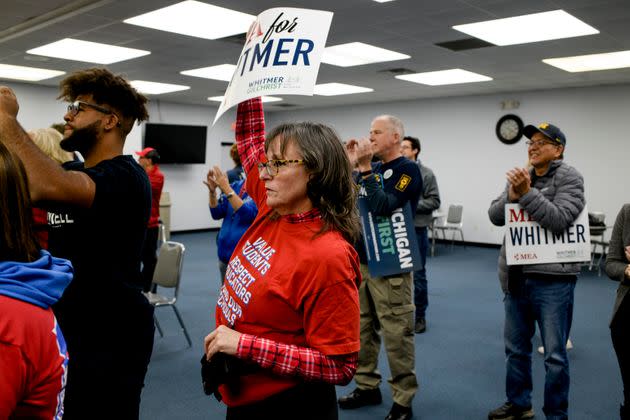
Liza Parkinson, an organizer with the Michigan Education Association, holds a sign in support of Whitmer during a campaign event at the UAW Local 3000 offices on Oct. 26. (Photo: Brittany Greeson for HuffPost)
When the Supreme Court issued its decision in Dobbs v. Jackson Women’s Health Organization, probably no politician in America was more vocal in their criticism than Whitmer ― and quite possibly none was more ready for action.
The possibility of abortion rights ending on Whitmer’s watch had been a subject of conversation among her and her advisers ever since 2018, according to several aides, when it came up as a possible topic in debate prep. It also came up in her meetings with abortion rights groups, in a way that made officials take notice of her interest and commitment. “She wasn’t just pantomiming it like a lot of politicians do,” Ilyse Hogue, who at the time was president of NARAL Pro-Choice America, told me. “She really seemed to understand and internalize that this was real, that it would be her responsibility.”
Hogue said that Whitmer had already “done her homework” by thinking through some of the levers a governor would have to protect abortion in a state with a decadesold ban on the books that conservative prosecutors could suddenly try to enforce if Roe fell. That possibility became a lot more real in late 2020, when Amy Coney Barrett took Ruth Bader Ginsburg’s place on the court, and then in early 2021, when the justices announced that they would hear Dobbs. It was during that period, aides say, serious discussions over gubernatorial action began.
One outcome of those discussions was a decision to file that preemptive lawsuit, blocking county prosecutors from enforcing the 1931 ban. That decision paid off in the weeks following Dobbs, when conservative prosecutors in two Michigan counties ― one around Grand Rapids, one around Jackson ― said they were ready to bring cases under the law. They never got the chance because a judge, ruling on Whitmer’s lawsuit, issued an injunction against enforcement until there’s a definitive ruling on how the 1931 law squares with existing privacy protections in Michigan’s Constitution.
The long-term future of abortion rights in Michigan will depend heavily on the outcome of the upcoming elections. A constitutional amendment on the ballot would make protection of abortion rights explicit, though its exact meaning would be subject to debate by lawmakers and interpretation by the state Supreme Court. If it fails, then the cases now in litigation will go to the court, giving it a chance to rule on whether the constitution as currently written permits a ban. It’s impossible to know how the court would rule or when, and who would be on it at that time. (Michigan’s Supreme Court justices are elected.)
Dixon has said that her position on abortion doesn’t matter, because voters will decide the issue when they vote on the amendment. But while a clear majority of Michiganders oppose abortion bans, as pollshaveshown consistently, the amendment’s popularity has been falling in the face of a relentless campaign supported by the Catholic Church and full of disinformation, like claims that it would allow minors to get gender reassignment surgery without a parent’s permission. If the amendment fails and Dixon wins, she’d be in a position to enforce the law, even if that’s not what most residents want.
It was during a debate about an abortion-related bill in 2013 that Whitmer revealed for the first time publicly that she had been a rape victim in college. The speech went viral, and Whitmer says she learned from that. “Like many women, I kept it to myself and I kind of tried to bury it,” Whitmer told me. “I had avoided talking about it for most of my life, other than with a few trusted partners that I’d had in different times of my life. But I think sharing it has helped me get more comfortable and more thoughtful and empathetic, in terms of supporting women who had [had a] similar circumstance, because there’s a lot of them, unfortunately.”
Over the past few months, she’s been sharing the story a lot more ― among other places, in a series of roundtables around the state. These are not campaign-style events where Whitmer gives a speech and crowds of supporters applaud. These are invitation-only, intimate gatherings ― sometimes just five or six women sitting around a table, sharing stories while Whitmer mostly listens. Staff say they pick the guests from letters the governor or state agencies get, rather than going through advocacy groups or the Democratic Party.
That may explain why many of the women present are Republicans ― or, at least, used to be. “Until June, until the Supreme Court decision, I was very much a conservative,” Krystal Carpenter, 43, told me after one such meeting, adding that she voted for Trump in 2016. “I never had to worry about my reproductive freedom. That changed real quick when Roe was overturned. I saw that my party turned its back on me.”
Carpenter was so angry that she wrote to every elected official she could think of — federal, state and local, Democratic and Republican. Whitmer’s office was the only one who answered, Carpenter said, and soon she got an invitation to a roundtable in Lansing. “I was sitting right to her, and she just listened, she took in every word, from every woman sitting there,” Carpenter said. “She looked at me as a woman, as a mother, as a wife — and I felt respected.”

A UAW worker wears a pin in support of Whitmer during a campaign event at the UAW Local 3000 offices on Oct. 26. (Photo: Brittany Greeson for HuffPost)
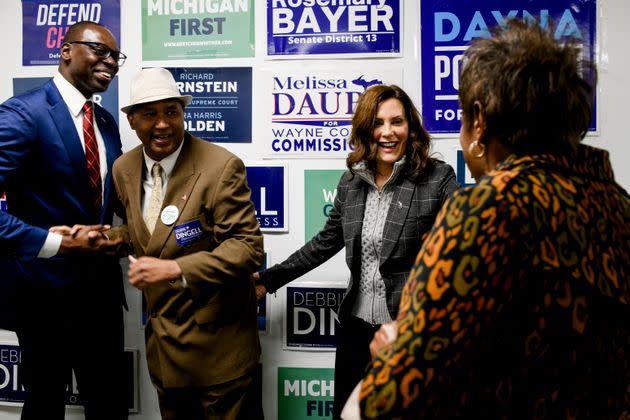
Whitmer greets Rodrick Casey, left, and Pecola Lewis, right, both of Ypsilanti Township, for a photo opportunity following a campaign event at a local campaign office in Canton on Oct. 26. (Photo: (Brittany Greeson for HuffPost))
At this point, there is no way to know how many people like Carpenter are out there, or whether they represent enough of a bloc to give Whitmer an electoral victory in such an otherwise difficult year for Democrats. Turnout among Black voters could fall short of expectations, as it did for Clinton in 2016, or Dixon’s focus on schools could boost turnout among her supporters. Either could lead to a Whitmer loss.
A Whitmer win, by contrast, would put her name more firmly into the conversation about future Democratic nominees for higher office — a possibility that came up in 2020, when the Biden campaign put her on the list of potential running mates.
Her candidacy would face all kinds of questions, while her governing record would have to withstand new, more intense scrutiny. She would have to prove she could hold up in a campaign that demanded more domestic policy vision, and foreign policy chops as well.
But she’d have a compelling case to make, having governed in a time of crisis, then winning votes from the same sorts of voters and in the same sorts of places that Democrats need to hold. Her one-on-one skills might play particularly well in the living rooms of Iowa and New Hampshire.
And it’s not like the political forces Whitmer is resisting in Michigan are likely to go away anytime soon. Access to abortion, the future of public schools, the stability of American democracy: all of them are going to be in play as long as MAGA acolytes are in charge of the Republican Party. The outcome of Michigan’s gubernatorial race could reveal a lot about how those battles are going to play out over the next few years — and who has the tools to fight them.
This article originally appeared on HuffPost and has been updated.
